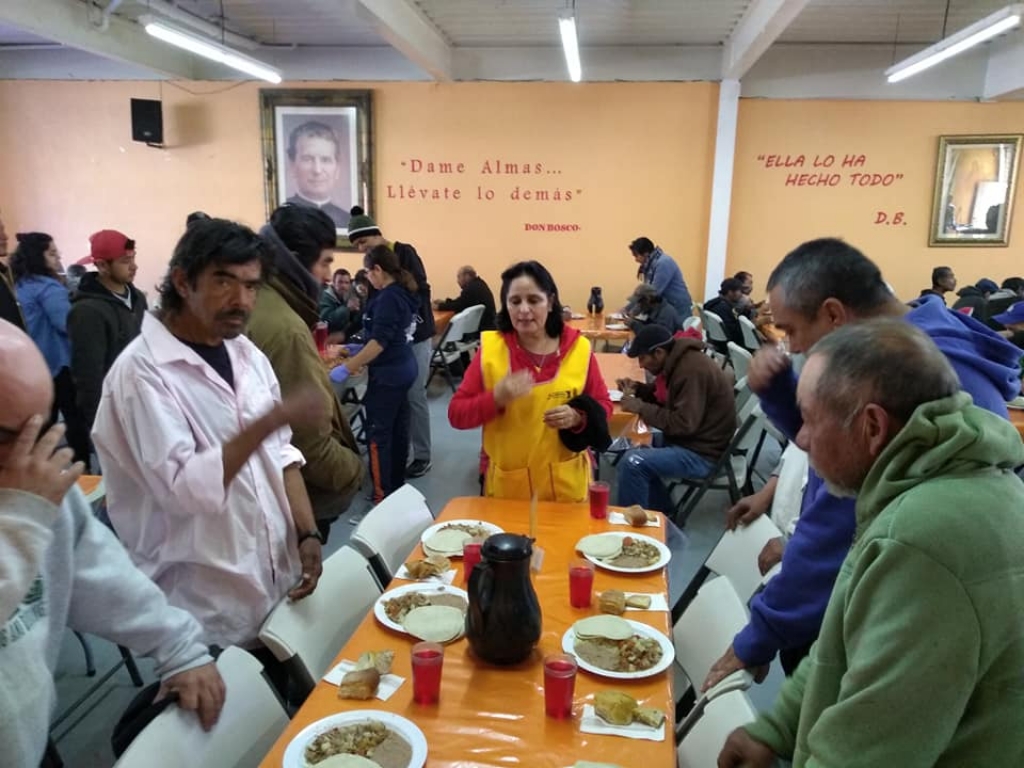MEXICO: Salesian Center in Tijuana provides meals, shelter and other critical resources to migrants and those at-risk

(MissionNewswire) Salesian missionaries are providing assistance to thousands of migrants and people at-risk through the Tijuana Salesian Project and the Salesian Refectory Padre Chava located at the Salesian Center in Tijuana, Mexico. The refectory provides meals and other assistance to migrants from Mexico, Central America and Haiti, as well as to homeless people, the elderly, people with disabilities and those suffering from extreme poverty.
Each day at the Padre Chava Refectory, 900 to 1,200 meals are served with numbers increasing during Christmas, Easter and summer. Recently, the numbers have been increasing due to the influx of migrants. Salesian missionaries are already serving their maximum number of 1,200 breakfasts and they are preparing to continue at that pace. In preparation, they are engaging 200 volunteers and additional supplies.
Salesian Father Agustín Novoa Leyva, who facilitates the Tijuana Salesian Project and the Salesian Padre Chava Refectory, notes, “From the moment we knew the migrant caravans from Honduras entered Mexico, we started to prepare. But in these situations, it is very difficult to foresee everything because unlike the other cities that they were in transit, here the path of the caravan to the United States cannot proceed beyond three months, according to the latest U.S. laws.”
Since 1987, the Salesian Center in Tijuana has been providing services to migrants and poor youth living on the border between Mexico and the U.S. The goal of the Tijuana Salesian Project is to create an extensive educational network in areas where poor youth are at risk of social exclusion. The project took shape through Salesian oratories and educational centers where children grow up learning to share faith, culture and sports within their communities.
The Salesian Center acts as a hub for migrants who, besides much-needed material help, are also offered a familiar and welcoming environment. They can access haircuts, a change of clothes, a shower and an opportunity to call and make contact with families. The Salesian Center also has a partnership with the Red Cross and local volunteer doctors who offer psychological and medical help and assistance.
Those dreaming of being reunited with their families in the U.S. and those deported from the U.S. often arrive at the center with very little. The Padre Chava Refectory helps migrants obtain or manage their official papers and documents and plays a very important role in caring for the Haitian migrants who have flocked into Tijuana. In addition, Padre Chava acts as a hub for care packages such as food and clothing that has been sent as aid to those in Mexico in response to recent earthquakes in the country.
“Migrants are people in a special situation. Perhaps they are experiencing their crises, and we do not understand their reactions,” explains Fr. Leyva. “Tijuana is a city that has always welcomed people. I hope it does not change in this case.”
The border between the U.S. and Mexico spans 1,969 miles and has more than 20 checkpoints along its route. Constant migration is taking place between the two countries with Mexican migrant workers traveling to U.S border towns seeking employment. Immigrants from both countries cross back and forth in addition to undocumented Mexicans being repatriated.
Many border towns feel the consequences of social and political tensions between the two nations. They are plagued by crime and violence such as the illegal trafficking of drugs, weapons, money and people. Salesian missionaries have been working in Mexico and in these border towns for more than 25 years and have recently increased cooperation between the Salesian Province of Mexico-Guadalajara and the Province of USA West. The goal is to work together to address the increase of violence and insecurity in the region and launch proposals for education, social integration, drug prevention and combating the effects of organized crime.
According to UNICEF, there are 52 million people living in poverty in Mexico, approximately 45 percent of the country’s population. For children, the rate rises to just over 53 percent with more than 20 million youth estimated to be living in poverty and 5 million of those in extreme poverty.
Salesian missionaries in Mexico primarily direct their efforts toward the country’s at-risk youth, including girls and young mothers. Creating safe havens and improving educational opportunities are essential to deter youth from life on the streets where they are susceptible to drugs and gang violence.
###
Sources:
ANS Photo (usage permissions and guidelines must be requested from ANS)
ANS – Mexico – Feast of St. Francis of Sales at refectory “Padre Chava”
UNICEF – Mexico




